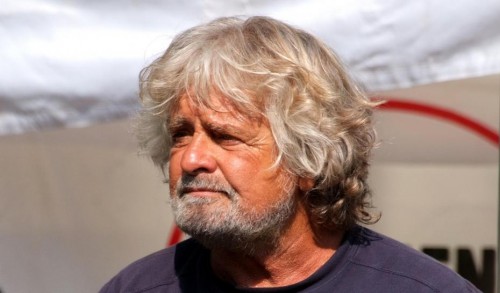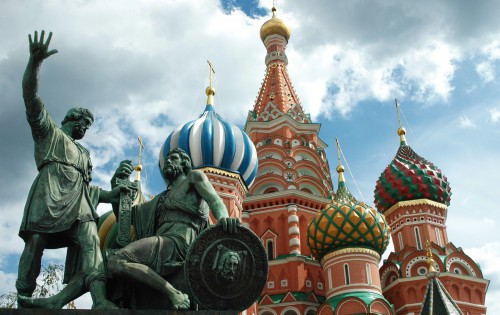dimanche, 04 mai 2014
Entretien géopolitique et économique avec Pierre-Yves Rougeyron
Entretien
géopolitique et économique
avec Pierre-Yves Rougeyron
Dans cet entretien au "Bréviaire des patriotes" réalisé le 22 avril 2014, Pierre-Yves Rougeyron, président du Cercle Aristote et fondateur de la revue Perspectives Libres, aborde les thèmes suivants : déclin des États-Unis, place de la Chine, de la Russie, la France dans le monde, l’impérialiste et l’anti-impérialisme français, la sortie de l’euro, la dette, l’ultra-libéralisme et le socialisme.
00:05 Publié dans Actualité, Affaires européennes, Economie, Entretiens, Géopolitique | Lien permanent | Commentaires (0) | Tags : économie, géopolitique, politique internationale, france, europe, affaires européennes, entretien, pierre-yves rougeyron |  |
|  del.icio.us |
del.icio.us |  |
|  Digg |
Digg | ![]() Facebook
Facebook
Presseschau - Mai 2014

00:05 Publié dans Actualité, Affaires européennes | Lien permanent | Commentaires (0) | Tags : allemagne, europe, affaires européennes, actualité, presse, journaux, médias |  |
|  del.icio.us |
del.icio.us |  |
|  Digg |
Digg | ![]() Facebook
Facebook
Los economistas, esos nuevos bufones
Por Juan Laborda*
Ex: http://www.elespiadigital.com
La pobreza, las desigualdades, la miseria, han vuelto de nuevo aquí para quedarse. No se trata del tercer mundo, ni de países en vías de desarrollo, mucho de los cuales están haciendo un esfuerzo titánico para mejorar las condiciones de vida de sus ciudadanos. No, nos referimos a nuestro Occidente decadente. Aquello por lo que nuestros antecesores lucharon con sangre, sudor y lágrimas se les quiere arrebatar a nuestras familias, a nuestros hijos, por parte de unos desalmados que, coaligados con una clase política mediocre, no dudan en aplicar toda una serie de políticas económicas injustas, dañinas, fracasadas. Y los economistas y la economía están siendo utilizados como meros esbirros y colaboradores al servicio de estas élites.
Que un mediocre como el señor Rajoy se vanaglorie de la caída y hundimiento de los salarios en nuestra querida España es un ejemplo de ello. Exactamente igual que cuando su antecesor en el cargo, el vacuo Rodríguez Zapatero, elogiaba la fortaleza de nuestro sistema bancario. Ya ni les comento las necedades del la inefable Fátima Bañez sobre nuestro mercado laboral. El problema no son ellos, son aquellos economistas que les asesoran y les enseñan economía en tres clases. Todos esos asesores comparten un denominador común, haberse formado bajo la ortodoxia neoclásica dominante. Una de dos o empezamos a exigir un cambio radical en los planes de estudio de economía y empresa, o al final los economistas seremos percibidos como los nuevos bufones de la corte. Pero vayamos por partes.
Crisis de visión del pensamiento económico
La actual crisis económica y financiera ha puesto de manifiesto el vacío intelectual y el escaso soporte empírico de la mayoría de las teorías macroeconómicas y microeconómicas que se enseñan en las Facultades de Ciencias Económicas y Empresariales de medio mundo. La crisis en cuestión es consecuencia de la ausencia de una visión, de un conjunto de aquellos conceptos políticos y sociales compartidos, de los que depende, en última instancia, la economía. A la decadencia de la perspectiva económica le han seguido diversas tendencias cuyo denominador común era una impecable elegancia a la hora de exponer los términos, acompañada de una absoluta inoperancia en su aplicación práctica.
Es necesario impulsar el nuevo pensamiento económico que está emergiendo de manera silenciosa, y que en última instancia trata de encontrar el paradigma perdido. Ello implica por un lado, un replanteamiento de la teoría y política económica, que permita una anticipación económica y política. Por otro, una revisión de las finanzas y del dinero, ya que la teoría financiera y monetaria moderna se construyó a partir de presupuestos metodológicos e hipótesis falsas. Además hay que introducir los efectos desestabilizadores del apalancamiento o endeudamiento masivo de los sectores privados. Finalmente se necesita una nueva explicación sobre el papel de la empresa y la gestión de las organizaciones. Para ello hay que dar a conocer los nuevos registros empíricos sobre el comportamiento de las empresas.
Ya no vale con un mero lavado de cara
El ritmo de deterioro económico y social es brutal, no solo en nuestro país sino también en las principales áreas geográficas. Les adjunto un artículo muy reciente relativo al incremento de la pobreza en Reino Unido. ¡Escandaloso! La mezcla de políticas económicas auspiciadas por la ortodoxia académica ha fracasado. Se propuso para salir de la crisis una combinación de política fiscal restrictiva, política monetaria expansiva (ampliación de los balances de la FED o del BCE), y deflación salarial, bajo una serie de hipótesis que han resultado ser falsas. Se ha hecho un diagnostico erróneo de lo que está pasando en el mundo. Como consecuencia, las recetas económicas no tienen el impacto deseado, y, como corolario, acaban generando pobreza, miseria, aumentando las desigualdades sociales. Como me recalca siempre un buen amigo, cada día esto se parece más a los "Juegos del Hambre".
Desde la llegada al poder de los neoconservadores Ronald Reagan y Margaret Thatcher se quiso recomponer el reparto de la tarta y de aquellos lodos, estas deudas. Había que desregular la actividad bancaria, había que facilitar el apalancamiento y la toma de riesgos sin control. El resultado ya lo conocemos, balances privados quebrados, la mayor acumulación de deuda de la historia, un sistema bancario occidental insolvente, pobreza, miseria. ¿Seguimos?
Por lo tanto, el objetivo ya no es adoptar modelos neoclásicos ortodoxos con fundamentos criticables y añadirles algunos supuestos cargados de realismo. Literalmente hay que tirarlos a la basura. Es necesario presentar y dar a conocer una alternativa que contradiga abiertamente los principales preceptos de la teoría neoclásica que inunda la mayoría de los análisis y que se publica sin rubor en los medios de comunicación masivos sin tan siquiera validar las hipótesis bajo los que se fundamentan.
Si no lo hacemos, si no abrimos las universidades a nuevas visiones, al final tendrán razón todos aquellos que nos ven a nosotros los economistas como los nuevos bufones. Y cobrará pleno sentido aquello que afirmaba el pensador Edgar Morin, "La economía, que es la ciencia social matemáticamente más avanzada, es la ciencia social y humanamente más retrasada, pues ha abstraído las condiciones sociales, históricas, políticas, psicológicas y ecológicas inseparables de las actividades económicas… Quizá la incompetencia económica haya pasado a ser el problema social más importante“.
*Economista
Fuente: Vozpopuli
00:05 Publié dans Economie | Lien permanent | Commentaires (0) | Tags : économie, bouffons, économistes |  |
|  del.icio.us |
del.icio.us |  |
|  Digg |
Digg | ![]() Facebook
Facebook
Grillo’s Populist Plan for Italy

Ellen Brown
www.webofdebt.com/articles/grillo.php
Default on the public debt, nationalization of the banks, and a citizen dividend could actually save the Italian economy.
Comedian Beppe Grillo was surprised himself when his Five Star Movement got 8.7 million votes in the Italian general election of February 24-25th. His movement is now the biggest single party in the chamber of deputies, says The Guardian, which makes him “a kingmaker in a hung parliament.”
Grillo’s is the party of “no.” In a candidacy based on satire, he organized an annual "V‑Day Celebration," the "V" standing for vaffanculo (“f—k off"). He rejects the status quo—all the existing parties and their monopoly control of politics, jobs, and financing—and seeks a referendum on all international treaties, including NATO membership, free trade agreements and the Euro.
"If we get into parliament,” says Grillo, “we would bring the old system down, not because we would enjoy doing so but because the system is rotten." Critics fear, and supporters hope, that if his party succeeds, it could break the Euro system.
But being against everything, says Mike Whitney in Counterpunch, is not a platform:
To govern, one needs ideas and a strategy for implementing those ideas. Grillo’s team has neither. They are defined more in terms of the things they are against than things they are for. It’s fine to want to “throw the bums out”, but that won’t put people back to work or boost growth or end the slump. Without a coherent plan to govern, M5S could end up in the political trash heap, along with their right-wing predecessors, the Tea Party.
Steve Colatrella, who lives in Italy and also has an article in Counterpunch on the Grillo phenomenon, has a different take on the surprise win. He says Grillo does have a platform of positive proposals. Besides rejecting all the existing parties and treaties, Grillo’s program includes the following:
- unilateral default on the public debt;
- nationalization of the banks; and
- a guaranteed “citizenship” income of 1000 euros a month.
It is a platform that could actually work. Austerity has been tested for a decade in the Eurozone and has failed, while the proposals in Grillo’s plan have been tested in other countries and have succeeded.
Default: Lessons from Iceland and South America
Default on the public debt has been pulled off quite successfully in Iceland, Argentina, Ecuador, and Russia, among other countries. Whitney cites a clip from Grillo’s blog suggesting that this is also the way out for Italy:
The public debt has not been growing in recent years because of too much expenditure . . . Between 1980 and 2011, spending was lower than the tax revenue by 484 billion (thus we have been really virtuous) but the interest payments (on the debt of 2,141 billion) that we had to pay in that period have made us poor. In the last 20 years, GDP has been growing slowly, while the debt has exploded.
. . . [S]peculators . . . are contributing to price falls so as to bring about higher interest rates. It’s the usurer’s technique. Thus the debt becomes an opportunity to maximize earnings in the market at the expense of the nation. . . . If financial powerbrokers use speculation to increase their earnings and force governments to pay the highest possible interest rates, the result is recession for the State that’s in debt as well as their loss of sovereignty.
. . . There are alternatives. These are being put into effect by some countries in South America and by Iceland. . . . The risk is that we are going to reach default in any case with the devaluation of the debt, and the Nation impoverished and on its knees. [Beppe Grillo blog]
Bank Nationalization: China Shows What Can Be Done
Grillo’s second proposal, nationalizing the banks, has also been tested and proven elsewhere, most notably in China. In an April 2012 article in The American Conservative titled “China’s Rise, America’s Fall,” Ron Unz observes:
During the three decades to 2010, China achieved perhaps the most rapid sustained rate of economic development in the history of the human species, with its real economy growing almost 40-fold between 1978 and 2010. In 1978, America’s economy was 15 times larger, but according to most international estimates, China is now set to surpass America’s total economic output within just another few years.
According to Eamonn Fingleton in In The Jaws of the Dragon (2009), the fountain that feeds this tide is a strong public banking sector:
Capitalism's triumph in China has been proclaimed in countless books in recent years. . . . But . . . the higher reaches of its economy remain comprehensively controlled in a way that is the antithesis of everything we associate with Western capitalism. The key to this control is the Chinese banking system . . . [which is] not only state-owned but, as in other East Asian miracle economies, functions overtly as a major tool of the central government’s industrial policy.
Guaranteed Basic Income—Not Just Welfare
Grillo’s third proposal, a guaranteed basic income, is not just an off-the-wall, utopian idea either. A national dividend has been urged by the “Social Credit” school of monetary reform for nearly a century, and the U.S. Basic Income Guarantee Network has held a dozen annual conferences. They feel that a guaranteed basic income is the key to keeping modern, highly productive economies humming.
In Europe, the proposal is being pursued not just by Grillo’s southern European party but by the sober Swiss of the north. An initiative to establish a new federal law for an unconditional basic income was formally introduced in Switzerland in April 2012. The idea consists of giving to all citizens a monthly income that is neither means-tested nor work-related. Under the Swiss referendum system of direct democracy, if the initiative gathers more than 100,000 signatures before October 2013, the Federal Assembly is required to look into it.
Colatrella does not say where Grillo plans to get the money for Italy’s guaranteed basic income, but in Social Credit theory, it would simply be issued outright by the government; and Grillo, who has an accounting background, evidently agrees with that approach to funding. He said in a presentation available on YouTube:
The Bank of Italy a private join-stock company, ownership comprises 10 insurance companies, 10 foundations, and 10 banks, that are all joint-stock companies . . . They issue the money out of thin air and lend it to us. It’s the State who is supposed to issue it. We need money to work. The State should say: “There’s scarcity of money? I’ll issue some and put it into circulation. Money is plentiful? I’ll withdraw and burn some of it.” . . . Money is needed to keep prices stable and to let us work.
The Key to a Thriving Economy
Major C.H. Douglas, the thought leader of the Social Credit movement, argued that the economy routinely produces more goods and services than consumers have the money to purchase, because workers collectively do not get paid enough to cover the cost of the things they make. This is true because of external costs such as interest paid to banks, and because some portion of the national income is stashed in savings accounts, investment accounts, and under mattresses rather than spent on the GDP.
To fill what Social Crediters call “the gap,” so that “demand” rises to meet “supply,” additional money needs to be gotten into the circulating money supply. Douglas recommended doing it with a national dividend for everyone, an entitlement by “grace” rather than “works,” something that was necessary just to raise purchasing power enough to cover the products on the market.
In the 1930s and 1940s, critics of Social Credit called it “funny money” and said it would merely inflate the money supply. The critics prevailed, and the Social Credit solution has not had much chance to be tested. But the possibilities were demonstrated in New Zealand during the Great Depression, when a state housing project was funded with credit issued by the Reserve Bank of New Zealand, the nationalized central bank. According to New Zealand commentator Kerry Bolton, this one measure was sufficient to resolve 75% of unemployment in the midst of the Great Depression.
Bolton notes that this was achieved without causing inflation. When new money is used to create new goods and services, supply rises along with demand and prices remain stable; but the “demand” has to come first. No business owner will invest in more capacity or production without first seeing a demand. No demand, no new jobs and no economic expansion.
The Need to Restore Economic Sovereignty
The money for a guaranteed basic income could be created by a nationalized central bank in the same way that the Reserve Bank of New Zealand did it, and that central bank “quantitative easing” (QE) is created out of nothing on a computer screen today. The problem with today’s QE is that it has not gotten money into the pockets of consumers. The money has gotten—and can get—no further than the reserve accounts of banks, as explained here and here. A dividend paid directly to consumers would be “quantitative easing” for the people.
A basic income guarantee paid for with central bank credit would not be “welfare” but would eliminate the need for welfare. It would be social security for all, replacing social security payments, unemployment insurance, and welfare taxes. It could also replace much of the consumer debt that is choking the private economy, growing exponentially at usurious compound interest rates.
As Grillo points out, it is not the cost of government but the cost of money itself that has bankrupted Italy. If the country wishes to free itself from the shackles of debt and restore the prosperity it once had, it will need to take back its monetary sovereignty and issue its own money, either directly or through its own nationalized central bank. If Grillo's party comes to power and follows through with his platform, those shackles on the Italian economy might actually be released.
Ellen Brown is an attorney and the author of eleven books, including Web of Debt: The Shocking Truth About Our Money System and How We Can Break Free. Her websites are webofdebt.com and ellenbrown.com. She is also chairman of the Public Banking Institute. Details of the June 2013 Public Banking Institute conference are here.
00:05 Publié dans Actualité, Affaires européennes, Economie, Politique | Lien permanent | Commentaires (0) | Tags : beppe grillo, économie, italie, politique internationale, affaires européennes, europe, alternative politique, politique |  |
|  del.icio.us |
del.icio.us |  |
|  Digg |
Digg | ![]() Facebook
Facebook
Cinq mythes sur la Russie actuelle

Cinq mythes sur la Russie actuelle
par Yvan Blot
Ex: http://aucoeurdunationalisme.blogspot.com
00:05 Publié dans Actualité, Affaires européennes | Lien permanent | Commentaires (0) | Tags : politique internationale, russie, europe, affaires européennes |  |
|  del.icio.us |
del.icio.us |  |
|  Digg |
Digg | ![]() Facebook
Facebook



